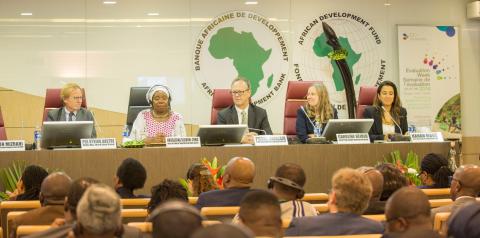
Abidjan, September 6, 2018 –The African Development Bank’s Independent Development Evaluation (IDEV) officially opened its biennial Development Evaluation Week on Thursday in Abidjan, Côte d’Ivoire, attended by more than 400 government policy- and decision-makers, representatives from development partners, research and academic institutions, evaluation associations and civil society. The Evaluation Week is also being attended by Bank shareholders, management and staff.
The three-day event examines the contribution evaluation can make to achieving greater development impact in Africa through learning from the past. The event was kicked-off on Wednesday by a knowledge café focusing on evaluations for greater impact in Bank operations, a professional development workshop on gender and evaluation, and a discussion on the OECD/DAC evaluation criteria.
The African Development Bank’s High 5 priorities -Light Up and Power Africa; Feed Africa; Integrate Africa; Industrialize Africa; and Improve the quality of life for the people of Africa- complement Africa’s ambitious 2063 targets, seek to plug the continent’s infrastructure gap and catalyze development projects that will lift the future generation out of poverty.
Many African countries on the path to transformation struggle with the ability to develop measurable outcomes, indicators and objectives that remain relevant and efficient. Central to the ability to successfully drive the transformation, will be effective monitoring and evaluation tools that give governments the opportunity to learn from successes and failures.
“Learning constructively from past successes, the Bank considers mistakes and experiences critical building blocks and tools for promoting accountability in development work, and key to more powerful development impact,” Vice President Pierre Guislain said in welcoming remarks made on behalf of Bank President Akinwumi Adesina, at the opening session.
IDEV evaluations and knowledge activities are critical to informing the strategic direction required for delivering high impact results on the Bank’s High 5’s. They provide evidence-based knowledge upon which decision makers and implementers can base policies, strategies and frameworks for charting their course towards achievement of economic and social prosperity for all.
“The Bank’s strength is that it can assist countries to create a conducive framework for evaluation,” said South African Minister for Planning, Monitoring and Evaluation, Nkosazana Dlamini-Zuma, who gave the opening keynote speech. “We need a collaborative effort of evaluators and implementers to achieve Agenda 2063,” she continued, “Africa has the capacity; we will and must succeed to reach the Africa we want”.
The Evaluation Week participants discussed some of the most urgent issues on Africa’s development agenda, such as the role of PPP’s in infrastructure development and agricultural value chains in achieving inclusion, examining what the lessons learned from evaluations are and how they can be put into action, especially in those sectors critical to eradicating poverty.
IDEV’s project cluster and thematic evaluation of nine Bank Agricultural Value Chain Development (AVCD) projects worth about $USD 4.3 billion during the period 2005-2016, examined their relevance, inclusiveness, effectiveness and sustainability. The results offer informative lessons on what worked well, what did not and why. Agriculture lies at the heart of the Bank’s Feed Africa initiative and is important to create sustainable agricultural systems, which link farmers to emerging economies and promote financial inclusion.
The reports established that the AVCD projects maintained high relevance to member countries, Bank strategies and target populations, but in many instances there was insufficient analysis in design of AVCD projects and approaches. Other snags were seen in ensuring inclusiveness and a lack of consideration of the value chain as a whole.
The discussion on PPPs, another key engine for economic growth, particularly in the Bank’s Industrialize Africa initiative, also uncovered many lessons, such as a lack of legal and regulatory frameworks for the private sector, lack of access to medium and long-term finance for private sector development, and the importance of trust between the public and private sector. PPPs typically offer countries more flexible opportunities for financing in agro-industries, high value, semi processed or processed exports, among others.
Here again, IDEV’s evaluations such as the ongoing evaluation of the Bank’s utilization of the Public Private Partnership Mechanism, 2006 – 2016 will provide recommendations for the future.
A third element that Evaluation Week 2018 highlights is the need for strong partnerships between governments, civil society, evaluation bodies, academia and development partners, in order to create a culture of development evaluation as well as build the capacity for evaluation in African countries. By raising both the supply and the demand for evaluation, it is hoped that their use in policy and decision-making is increased.
Building on evidence-based evaluation and lessons learned ensures that ongoing and future projects avoid the mistakes of the past and that policy makers and implementers are armed with information to make changes or to take new direction to ensure efficient outcomes.
The results will be delivery of the Agenda 2063 which the whole continent is hoping for.


